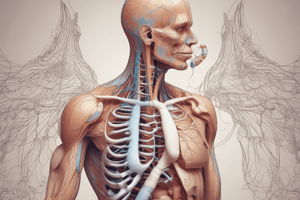Podcast
Questions and Answers
What primary gas do cells use for metabolic reactions?
What primary gas do cells use for metabolic reactions?
- Hydrogen
- Carbon dioxide
- Oxygen (correct)
- Nitrogen
What happens if there is an excessive amount of CO2 in cells?
What happens if there is an excessive amount of CO2 in cells?
- It produces alkalinity
- It produces glucose
- It produces acidity (correct)
- It produces toxicity (correct)
Which systems cooperate to supply O2 and eliminate CO2?
Which systems cooperate to supply O2 and eliminate CO2?
- Digestive and excretory systems
- Cardiovascular and respiratory systems (correct)
- Skeletal and muscular systems
- Nervous and endocrine systems
What is one of the major functions of the respiratory system?
What is one of the major functions of the respiratory system?
What would be a consequence of the respiratory system's failure?
What would be a consequence of the respiratory system's failure?
What waste product do cells produce from metabolic reactions?
What waste product do cells produce from metabolic reactions?
Besides gas exchange, what is another function of the respiratory system?
Besides gas exchange, what is another function of the respiratory system?
How does the respiratory system contribute to temperature regulation?
How does the respiratory system contribute to temperature regulation?
Flashcards are hidden until you start studying
Study Notes
The Respiratory System
- Responsible for exchanging gases (oxygen and carbon dioxide) between air, blood, and tissue cells.
- Helps regulate blood pH.
Maintaining Homeostasis
- Cells use oxygen for metabolic reactions to generate ATP (energy currency).
- Cells produce carbon dioxide as a waste product.
- Excessive CO2 can be toxic to cells, producing acidity.
- The respiratory system eliminates CO2 and supplies oxygen, while the cardiovascular system transports blood containing these gases between lungs and body cells.
- Failure of the respiratory system can cause rapid cell death due to oxygen deprivation and waste accumulation.
Other Functions
Respiratory System Functions
- Regulates blood pH.
- Contains receptors for the sense of smell.
- Filters inspired air.
- Produces sound.
- Removes water and heat from the body through exhaled air.
Studying That Suits You
Use AI to generate personalized quizzes and flashcards to suit your learning preferences.



